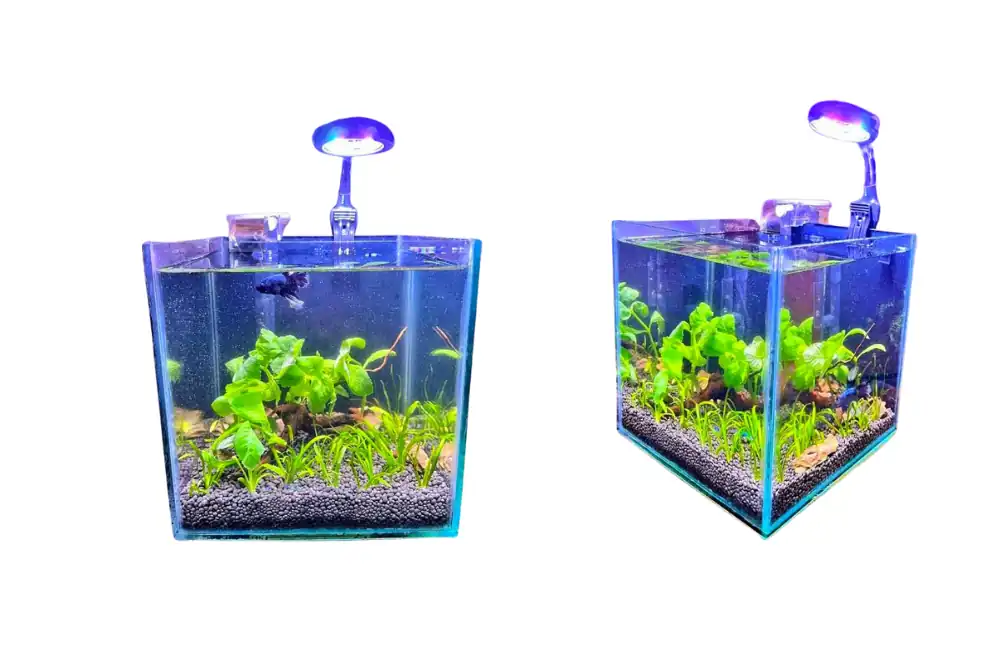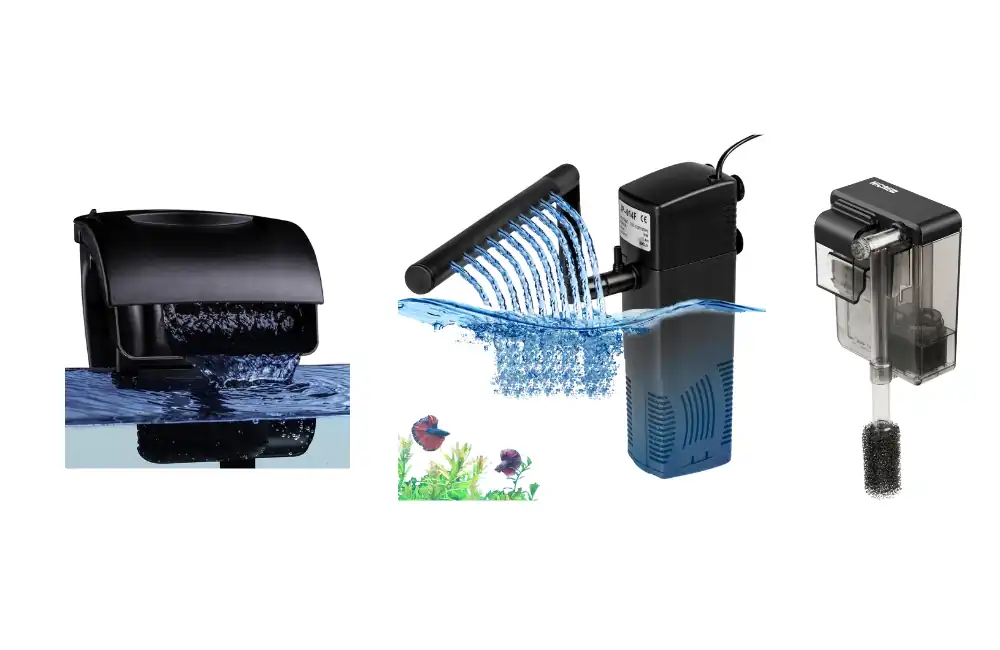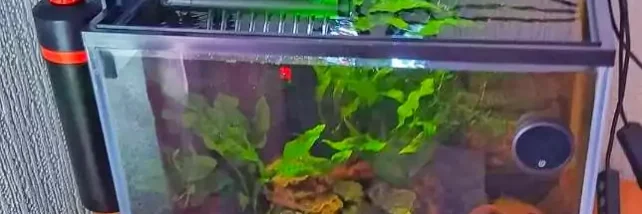The betta fish is one of the most controversial species in the gourami family, with many debated topics surrounding its care. One of the most discussed issues among fish enthusiasts is whether or not bettas require a filter. Some argue that a filter is essential for a betta health while others believe that bettas can thrive without one.
And that confusion can be stressful. You just want to do what’s right for your fish. Be with us. You’ll get a clear answer on whether bettas need a filter, why it matters and how to set things up the right way.
Role of Filter in Betta Tank
Before jumping into the discussion about the need for a filter for a betta fish, it’s worth learning what the purpose of a filter is. The answer to this question will reveal the fact about the need for filters for betta fish.
A filter in a fish tank is a device in which water is pulled through a pump or flow system and passes through a media in order to remove debris, harmful bacteria or other toxic chemicals from the water. A filter media can be:
- A sponge, filter pad or mesh material, removing the debris such as uneaten food from the tank. (Mechanical filtration)
- Bio balls or ceramic rings, allowing the beneficial bacteria to grow for nitrification. (Biological filtration)
- Or an activated carbon, removing the tennis or medication residues from the water. (Chemical filtration)
Do Betta Fish Need a Filter?
Now comes the debatable question, do betta fish need a filter?
The answer to this question can’t be answered simply in Yes or No. It depends upon several factors including tank size, type of betta, flow rate and compatibility with plants and decorations. If yes, what is the best filter for a betta fish tank? And if not, how long can they live without a filter? What are the other alternatives to be used in filterless tanks?

Betta fish don’t necessarily need a filter, but it’s highly recommended. Depending on the care, you can keep your betta alive without a filter for a time but he will not thrive in this case. While betta fish can survive without a filter in specific conditions, using a filter significantly reduces maintenance efforts and ensures a more stable and healthy environment. Without a filter, you must perform more frequent water changes to control ammonia, nitrite and nitrate levels.
Do Bettas Have Filters in Wild?
You might wonder why the betta experts focus on using the filter in tanks if no filter is installed in their natural habitats. In the wild, betta fish live in slow-moving waters like rice paddies, shallow ponds and streams, which have natural filtration processes. They contain plants and microorganisms and have a constant flow of water, which helps break down waste, remove toxins and oxygenate the water.
In aquariums, these natural processes are ensured by using the filters. If you are not using the betta tank filter, you are depriving your betta of these natural processes.
Misconceptions About Bettas and Filters
A common misconception is that bettas, being hardy fish, can thrive in unfiltered tanks or even small bowls. While they can survive in such conditions, it is not ideal for their long-term health.
Most betta owners argue that in the wild, bettas breathe from the water surface using their labyrinth organs, which makes them capable of living in tanks without filters. But here’s the thing, just because they can breathe air doesn’t mean they don’t need clean water. Some people think this means bettas can live in tiny and unfiltered bowls. That’s not more than a myth. They still need good water quality and proper filtration to stay healthy and happy.
Keep in mind that a filter not only oxygenates the tank; instead, it has many other benefits that are crucial for the prosperous life of betta fish.
Betta Tanks without Filter
Avoiding filters in betta tanks will require more effort to maintain the tank conditions. In filterless setups, it becomes more challenging to ensure better care of the fish. In such tanks, water quality deteriorates quickly, leading to stress, disease and a shorter lifespan of the fish. Stagnant water in betta tanks increases the buildup of harmful bacteria, parasites and fungi that may lead to severe health concerns like fin rot, ich (white spot disease), and other bacterial or fungal diseases.
You may need to perform large weekly water changes to keep ammonia and nitrite levels to the least minimum. Water changes must be done every 24-72 hours to avoid health risks to the fish.
Those who choose to go filterless tanks will need to have a larger tank, a heavily planted setup, and regular water changes.
Benefits of Filter
Helps in Nitrogen Cycle
When your betta eats and poops, it creates waste and that waste turns into ammonia, which is toxic to fish. Then helpful bacteria, Nitrosomonas come in and turn ammonia into nitrite (still toxic). Another type of bacteria, Nitrobacter change nitrite into nitrate, which is less harmful in small amounts.
These good bacteria mostly live in the filter media and also in the tank substrate like gravel or sand. That’s one big reason why having a filter is so important. It’s not just for moving water, it’s the main home for these helpful bacteria that keep your tank safe.
Removes Debris
A filter in an aquarium traps solid debris such as fish waste, uneaten food and plant matter. These things can make the water dirtier and unsuitable for bettas to live in. A filter also ensures better water circulation, oxygenation and clarity.
A filter simplifies tank maintenance, reduces maintenance efforts and makes the hobby for beginners more friendly.
To reap all these benefits, you’ll need to use a filter in betta tanks. Otherwise, you’ll need to perform an extreme level of tank care and experience difficulty maintaining the water conditions.
Factors to Consider When Using a Filter
It’s not as simple as putting a filter in a tank and just waiting for the result. Instead, you’ll need to consider certain factors while using it.
Tank Size Considerations
It’s advisable not to keep the betta in a tank smaller than 2.5-gallon, as it’s the least recommended. However, if you opt for one on a temporary basis, it’s recommended not to use the filter in a tank of this size. We suggest so for two reasons.
First, you’ll find it very challenging to fit the filter on the tank appropriately. Second, in tanks smaller than 2.5-gallon, the filter can cause too much water flow due to the limited volume of water, which is not in favor of betta fish. You’ll need frequent water changes (every 2-3 days) to maintain water quality. If you must use a filter, consider a sponge filter or gentle nano filter that creates slow water currents.
For any tank greater than 2.5-gallon, filters are highly recommended.
| Tank Size | Betta Filter Type | Why |
|---|---|---|
| 2.5 – 5 G | Sponge Filter | Gentle flow, affordable, great for small tanks and betta fry tanks. |
| 5 – 10 G | Sponge Filter or HOB Filter | Sponge for gentler flow. HOB if chemical filtration is needed. |
| 10 – 20 G | HOB or Internal Filter | HOB for ease of use and complete filtration. Use baffle to reduce water flow. Internal filter if space-saving is important. |
| 20-G + | HOB or Canister Filter | Canister for larger, heavily stocked tanks. HOB filter for moderate setups. |
Remember, these filter types’ recommendations for the respective tank size are not the final ones and are not harsh to follow. You can go for any type of filter that seems to suit your needs and those of your betta.
Flow Rate
Bettas do not appreciate strong water currents due to their long and delicate fins, which can make swimming difficult. The strong current of water can cause the betta from swim bladder disease. You need to opt for sponge filters or other low-flow filters that provide gentle water movement without stressing the fish.
Filter Size
The size of the filter should match the tank size to ensure it fits well and provides adequate filtration. A large filter in a small tank may cause excessive water movement while a small filter in a large tank may not be efficient. Always match the filter size to the tank capacity.
Highly Recommended for Beginners
From my experience, a filter really helps if you’re just getting into the hobby or starting out with bettas. A newbie might experience serious difficulty remedying the effects of not using the filter.
Those new to the fish hobby usually don’t have a practical understanding of tank maintenance such as the nitrogen cycle and heavily planted setups. They must use filters in their betta tanks; otherwise, they may experience serious consequences of tank degradation.
If we even suggest going without a filter, compensation is only for experienced betta keepers who are skilled in betta care.
Picking the Right Filter for Your Betta
Make sure your betta tank is at least 5 gallons. This size helps the filter work well and keeps the water stable. Smaller tanks make it harder to keep the water clean and healthy.
When choosing a filter, pick one that fits your tank size and doesn’t have too strong a flow. Bettas don’t like rough water, so look for filters with adjustable flow or ones made especially for bettas like sponge filters or filters with baffles to slow the water.
Some brands make filters that are quiet and gentle. These are perfect for small betta tanks. Look for trusted names or filters made just for small setups to make sure your betta stays happy and comfortable.
Going with well-known, reliable filters means you’re giving your fish the best care without stressing them out.
Best Betta Filter Recommendations

1. Marineland Penguin Bio-Wheel Power Filter
Check it on Amazon
This filter is our top recommendation for its long-lasting durability and easy maintenance. It uses the bio-wheel technology, which provides excellent biological filtration. Plus, the filter brings out mechanical, biological and chemical filtration, keeping the tank clean from every aspect. It comes in five different sizes, suiting best to your needs.
Being an HOB filter, it might work well for your larger tank but upon our testing, we considered it best for something smaller than 10 gallons because it lacks the power and efficiency needed for bigger tanks. If you are starting out, surely opt for this filter.
2. Tetra Whisper IQ Power Filter for 20 Gallons
Check it on Amazon
This is the filter we are using for our own 20-gallon betta tank. Without exaggeration, the Tetra Filter is our most favored betta tank filter for its quietness, customizability and excellent flow control, which are crucial for betta fish. While it requires regular cleaning and maintenance, its durability and performance make it worth it.
In addition to this, the flexibility to use your own media can save you money in the long run. I highly recommend this filter for your betta tank.
Replacement Cartridges
If you are using the sponge filter and need replacement filter cartridges, the Aqueon Replacement Cartridges (Check it on Amazon) are the best to go for. They come in multiple sizes, which you can buy according to your tank requirement. These cartridges are easy to install and have a high-quality activated carbon.
How to Install the Filter in Your Betta Tank?
First, rinse the filter parts with clean water before setting it up. Follow the instructions that come with your filter carefully to install it correctly in your tank.
Make sure the filter flow isn’t too strong. Bettas prefer gentle water movement. If your filter has adjustable flow or a sponge pre-filter, use those to slow it down.
Once installed, plug it in and check that water is flowing smoothly. Keep an eye on it regularly to make sure it’s working well and not disturbing your betta.
Alternatives to Filter
If you have difficulty going with a filter, likely because of tank size, compatibility with fish or plants or any other reason, there are other alternatives. Experienced fish keepers attempt these techniques to mimic natural filtration.
Walstad Method
The widely used method, recommended by most betta aquarists is the Walstad method. In this technique, a heavily planted setup is created with a deep substrate to ensure dense plant growth. Plants perform the natural filtration process by absorbing nitrates and helping stabilize the ecosystem.
Remember, this method requires at least 30-40% plant cover and substantial maintenance including frequent water changes to reduce waste. You can perform the process in a larger tank of size at least 10 gallons.
We recommend the Walstad technique only when you have a better understanding of how plants and bacteria balance the water chemistry. Although this technique is not equivalent to traditional filters, it’s far better than filterless setups.
Conclusion
Hopefully, it’s evident to you what aquarium filters are. Why do we add them to fish tanks? And do betta fish need them or not? We conclude our comprehensive guide about the betta tank filters into more simple and concise words.
While it is possible to keep a betta in a tank without a filter, it is not ideal. Even in filterless setups, adding a small, quiet filter can significantly improve water quality and reduce the frequency of water changes.
If you choose to go without a filter, be prepared for a larger tank, more frequent water changes and live plants to assist with water quality. Bettas thrive in clean, well-maintained tanks, and filters play an essential role in achieving that. For most betta owners, especially beginners, using a filter is the best option for maintaining a healthy, happy betta fish.




